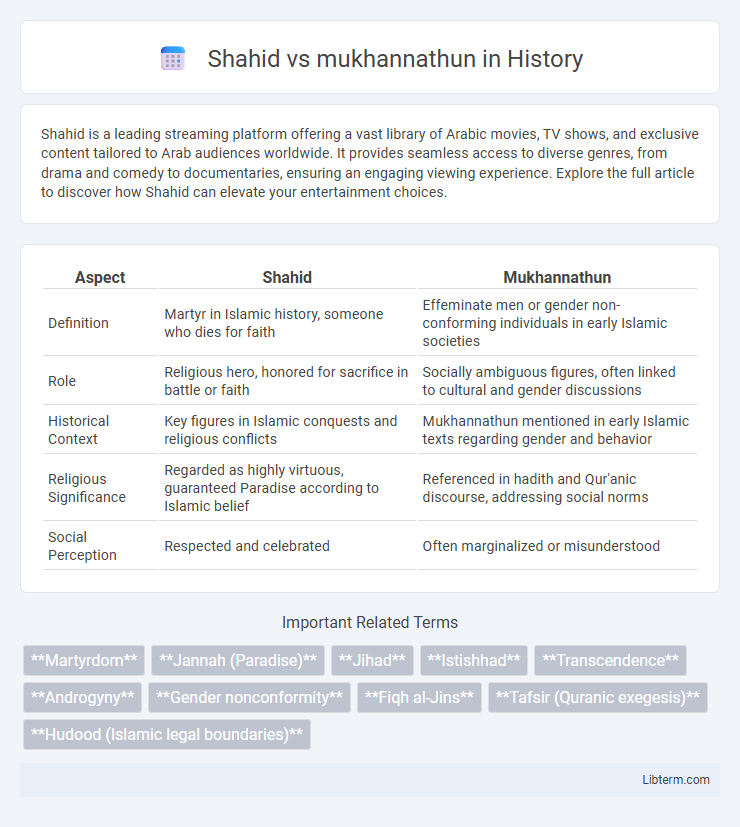Shahid is a leading streaming platform offering a vast library of Arabic movies, TV shows, and exclusive content tailored to Arab audiences worldwide. It provides seamless access to diverse genres, from drama and comedy to documentaries, ensuring an engaging viewing experience. Explore the full article to discover how Shahid can elevate your entertainment choices.
Table of Comparison
| Aspect | Shahid | Mukhannathun |
|---|---|---|
| Definition | Martyr in Islamic history, someone who dies for faith | Effeminate men or gender non-conforming individuals in early Islamic societies |
| Role | Religious hero, honored for sacrifice in battle or faith | Socially ambiguous figures, often linked to cultural and gender discussions |
| Historical Context | Key figures in Islamic conquests and religious conflicts | Mukhannathun mentioned in early Islamic texts regarding gender and behavior |
| Religious Significance | Regarded as highly virtuous, guaranteed Paradise according to Islamic belief | Referenced in hadith and Qur'anic discourse, addressing social norms |
| Social Perception | Respected and celebrated | Often marginalized or misunderstood |
Introduction: Defining Shahid and Mukhannathun
Shahid refers to a martyr in Islamic terminology, denoting an individual who sacrifices their life in the path of God and is granted a revered status in religious texts. Mukhannathun describes effeminate men or individuals exhibiting gender nonconformity in early Islamic societies, often discussed within historical and jurisprudential contexts. Understanding these terms involves exploring their distinct social, religious, and legal implications within Islamic tradition.
Historical Context of Shahid and Mukhannathun
The term "Shahid" historically refers to martyrs in Islamic tradition, individuals who died in the path of God, often during battles or struggles for faith. "Mukhannathun" were effeminate men or gender non-conforming individuals in early Islamic society, who held ambiguous social and religious positions. Historical texts and hadith literature reveal complex interactions between the community and Mukhannathun, highlighting societal attitudes and legal responses during the formative centuries of Islam.
Religious Significance in Islam
In Islamic tradition, the terms Shahid and Mukhannathun hold distinct religious significance; a Shahid refers to a martyr who dies in the cause of Allah, attaining a highly honored spiritual status with promises of paradise and divine reward. Mukhannathun, historically identified as effeminate men or transgender individuals, were acknowledged in early Islamic society but faced varying degrees of social and religious scrutiny based on interpretations of gender norms in the Quran and Hadith. The differentiation underscores Islam's nuanced approach to spiritual martyrdom and gender identity within its religious and legal frameworks.
Social Perceptions and Stigmas
Social perceptions of Shahid and Mukhannathun are shaped by contrasting stigmas, where Shahid is often associated with valor and martyrdom, while Mukhannathun faces marginalization due to non-conforming gender expressions. The stigma surrounding Mukhannathun is deeply embedded in cultural and religious norms, leading to social exclusion and discrimination. These divergent societal attitudes highlight persistent challenges in acceptance and representation of gender diversity within traditional frameworks.
Gender Roles: Contrasting Shahid and Mukhannathun
Shahid and Mukhannathun represent contrasting gender roles within early Islamic society, with Shahid typically embodying martyrdom linked to masculine valor, while Mukhannathun refers to effeminate men or gender-nonconforming individuals often occupying ambiguous social positions. The rigid gender norms positioned Shahid as a symbol of honor and sacrifice aligned with traditional male virtues, whereas Mukhannathun challenged binary gender expectations and faced social marginalization or roles distinct from conventional masculinity. This dichotomy reflects broader tensions in historical gender constructs and societal acceptance in the Islamic cultural context.
Legal Status and Rights Across Eras
The legal status and rights of Shahid and Mukhannathun varied significantly across Islamic history, with Shahid often recognized as martyrs granted honor and spiritual reward, while Mukhannathun, gender-nonconforming individuals, faced fluctuating acceptance depending on cultural and legal contexts. In early Islamic societies, Mukhannathun were sometimes protected and held roles in music and social functions, but later periods saw stricter legal regulations limiting their public participation and rights. Contemporary legal systems in Muslim-majority countries reflect diverse approaches, ranging from criminalization to gradual recognition of gender diversity, illustrating evolving interpretations of Sharia and human rights frameworks.
Representation in Islamic Literature and Hadith
The depiction of Shahid (martyrs) and Mukhannathun (effeminate men) in Islamic literature and Hadith reveals contrasting symbolic roles, where Shahid are celebrated as heroic figures attaining divine reward, while Mukhannathun are often discussed with caution regarding gender norms and social behavior. Classical Hadith collections, such as Sahih Bukhari and Sahih Muslim, contain narrations that address the treatment and societal position of Mukhannathun, reflecting early Islamic attitudes towards gender nonconformity. The representation underscores a theological framework that elevates martyrdom as spiritual exaltation, whereas Mukhannathun are contextualized within normative discourse on gender roles and morality in early Islamic communities.
Contemporary Debates and Interpretations
Contemporary debates on Shahid versus Mukhannathun explore gender identity and religious testimony within Islamic jurisprudence, emphasizing evolving interpretations of classical texts. Scholars investigate how historical contexts affect the status of Mukhannathun, challenging traditional notions and advocating for inclusive understanding in modern legal and social frameworks. This discourse reflects broader discussions on gender diversity and the reconciliation of scriptural authority with contemporary human rights perspectives.
Impact on LGBTQ+ and Gender Discourse
Shahid vs Mukhanathun marked a pivotal shift in legal and social perceptions of LGBTQ+ identities, challenging prevailing norms and sparking critical discourse on gender fluidity in South Asia. The case highlighted the systemic discrimination faced by transgender and non-binary individuals, prompting calls for inclusive policies and greater recognition of diverse gender expressions. Its impact resonates in contemporary gender debates, fostering increased visibility and advocacy for LGBTQ+ rights within legislative and societal frameworks.
Conclusion: Bridging Tradition and Modernity
Shahid and mukhannathun represent complex social and cultural identities in Islamic history, illustrating the dynamic interplay between gender and spirituality. Contemporary discourse emphasizes embracing these identities within modern frameworks, fostering inclusivity while respecting traditional values. This synthesis bridges historical understanding with current human rights approaches, promoting a more nuanced appreciation of diversity.
Shahid Infographic

 libterm.com
libterm.com